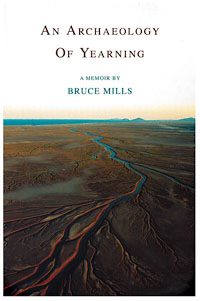 Kalamazoo College Professor of English Bruce Mills’s fifth book, An Archaeology of Yearning, has been published by Etruscan Press. Using the metaphor of an archeological dig, Mills maps the artifacts of life as a father of a son with autism and as a boy himself growing up in Iowa. Of the book, Carolyn Kuebler, editor of the prestigious New England Review, writes: “This urgent and affecting memoir of parenthood is also a testimony to the way acts of imagination can lead us out of isolation and into communion with others, however tentative.” Ginger Strand ’87, author of Inventing Niagara: Beauty, Power, and Lies and Killer on the Road: Violence and the American Interstate, states that Mills “has written a rare and grace-filled book, one as true to reality-bound family life as it is to the soaring speculative beauty of archaeology, history, and thought. We come away with a deeper understanding of what it is to be a parent, a family, and finally, a human being.” Information about the book and upcoming events, including a reading on Tuesday, November 12, 7-8 pm, at Chelsea (Michigan) Public Library can be found on Mills’s blog.
Kalamazoo College Professor of English Bruce Mills’s fifth book, An Archaeology of Yearning, has been published by Etruscan Press. Using the metaphor of an archeological dig, Mills maps the artifacts of life as a father of a son with autism and as a boy himself growing up in Iowa. Of the book, Carolyn Kuebler, editor of the prestigious New England Review, writes: “This urgent and affecting memoir of parenthood is also a testimony to the way acts of imagination can lead us out of isolation and into communion with others, however tentative.” Ginger Strand ’87, author of Inventing Niagara: Beauty, Power, and Lies and Killer on the Road: Violence and the American Interstate, states that Mills “has written a rare and grace-filled book, one as true to reality-bound family life as it is to the soaring speculative beauty of archaeology, history, and thought. We come away with a deeper understanding of what it is to be a parent, a family, and finally, a human being.” Information about the book and upcoming events, including a reading on Tuesday, November 12, 7-8 pm, at Chelsea (Michigan) Public Library can be found on Mills’s blog.
Bruce Mills appeared on WWMT-TV Ch. 3 on Sunday Nov. 24 to discuss his book.
Michigan Radio broadcast an interview with Prof. Mills on Jan 22. Listen here: http://michiganradio.org/post/one-michigan-familys-journey-autism



